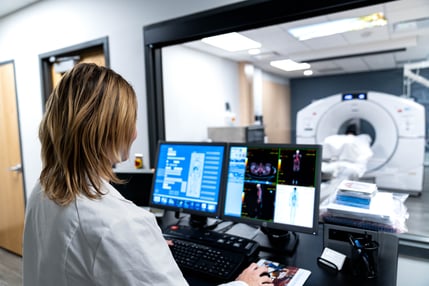What Are Bladder Cancer Symptoms and 9 Other Common Questions
5 min read

If you or someone you love has been diagnosed with bladder cancer, you probably have a lot of questions. Rocky Mountain Cancer Centers (RMCC) has put together this list of 10 frequently asked questions about bladder cancer symptoms, risk factors, and treatment options.
1. What Is Bladder Cancer?
Bladder cancer is a condition caused by cells in the bladder that begin to grow uncontrollably. Some common types of bladder cancer include:
- Adenocarcinoma – Cancer that starts in glandular cells. According to the American Cancer Society, around 1% of bladder cancers are adenocarcinomas.
- Squamous cell carcinoma – Cancer that starts in the squamous cells, the thin, flat cells lining the bladder's inside.
- Transitional cell carcinoma – Cancer that starts in urothelial cells that line the innermost layer of the bladder wall and other parts of the urinary tract. This is the most common type of bladder cancer.
2. What Are Common Bladder Cancer Symptoms?
One of the first symptoms of bladder cancer is blood in the urine. In its early stages, bladder cancer often causes no other symptoms. You might, however, experience these other bladder cancer symptoms:
- Abdominal pain
- Bone pain, if cancer has spread to the bone
- Difficulty urinating or having a weak urine stream
- Feeling as if you need to urinate right away, even if your bladder isn't full
- Feeling tired or weak
- Feet swelling
- Having to urinate more often than usual
- Having to use the bathroom many times throughout the night
- Inability to urinate
- Loss of appetite
- Lower back pain on one side
- Pain or burning during urination
- Weight loss
Some symptoms overlap with urinary tract infections and other conditions, so the only way to know if you have bladder cancer is to get tested. Early detection is vital for the best outcome, so if you think you have bladder cancer, talk to your health care provider.
3. How Is Bladder Cancer Diagnosed?
According to the National Cancer Institute, there is no routine screening exam for bladder cancer. If you experience symptoms, your health care provider may perform the following tests or procedures:
 CT Scan – A CT scan can show tumors that are growing in the bladder
CT Scan – A CT scan can show tumors that are growing in the bladder- Cystoscopy – During a cystoscopy, your provider inserts a thin tube into the urethra in the bladder to look for abnormalities.
- Intravenous pyelogram (IVP) – An IVP takes X-ray images of the urinary system using a special dye to check for blockages.
- Urinalysis – During a urinalysis, your provider will test for the color and contents of the urine.
- Urine cytology – A urine cytology is a test that checks for urine abnormalities under a microscope.
4. What Are the Risk Factors for Bladder Cancer?
Some risk factors for bladder cancer aren’t in your control, such as your race, age, sex, or family history. For instance, white people are more likely to develop bladder cancer, and so are people older than 55. Bladder is also more common in men than women, and people with a family member who had bladder cancer have a higher risk of developing it themselves. Bladder cancer is also more prevalent in those born with a bladder birth defect and in people who experience chronic bladder infections or irritations.
Other risk factors are in your control. These include smoking, workplace exposure, taking certain medications, not drinking enough fluid, and drinking arsenic in water.
According to the American Cancer Society, people who smoke are three times more likely to develop bladder cancer than those who don’t. Workplace chemicals such as benzidine and beta-naphthylamine have also been linked to a higher risk for bladder cancer. A diabetes medication called pioglitazone can increase risk, particularly in people who take higher doses.
If you drink a lot of water every day, you will have a less likely chance of developing bladder cancer. Experts think this could be because you empty your bladder more often, reducing exposure to chemicals in the bladder. However, if your water contains arsenic, your risk increases. Most people in the United States, however, don’t need to worry about this particular concern.
5. Does Bladder Cancer Progress Quickly?
How quickly bladder cancer grows depends on the grade or how the cancer looks under a microscope. Low-grade bladder cancer cells appear like normal bladder cells and typically grow slowly. High-grade bladder cancer cells are more abnormal in appearance and grow more quickly. High-grade bladder cancer is more challenging to treat than low-grade.
6. Where Does Bladder Cancer Spread?
Bladder cancer can spread to other parts of the body. Often, the first place bladder cancer spreads is to the lymph nodes in the pelvis. It can also spread to the bones, liver, and lungs.
7. What are the Treatment Options for Bladder Cancer?
Treatment plans for bladder cancer vary based on the cancer stage and whether it has spread. Typical treatments include surgery for bladder removal, chemotherapy, radiation therapy, and immunotherapy. Stage 2 and stage 3 bladder cancers will most likely need to remove either part of the bladder or the entire bladder. Cancer care during the early stages may only require tumor removal instead of removing part of the bladder.
RMCC also participates in clinical trials for bladder cancer which make the latest innovations available to RMCC patients.
8. What Are the Complications of Bladder Cancer?
Some common complications of bladder cancer include erectile dysfunction, urinary incontinence, and urethral stricture. Erectile dysfunction in men can happen due to radiation therapy or nerve damage from surgery. Urinary incontinence is an accidental urine loss or leaking due to radiation to the pelvis, chemotherapy, or muscle weakness. Urethral stricture is a condition that blocks or slows the flow of urine.
9. What Questions Should You Ask a Bladder Cancer Specialist if You Have Bladder Cancer?
If you have been diagnosed with bladder cancer, you may want to ask your bladder cancer specialist the following:
- What type of bladder cancer do I have?
- How large is the tumor?
- Is there more than one tumor?
- Is the tumor high grade or low grade?
- Has the cancer spread beyond my bladder?
- What is my treatment plan?
- How soon will I start treatment?
- How will we know the treatment is working?
- How can I manage side effects of treatment?
- What symptoms or side effects should I report to you?
- If my cancer comes back, what are my cancer care options?
10. Are There Support Groups for People with Bladder Cancer?
Research on cancer support groups shows that it can increase your quality of life. They can also help you build a social support system and help you cope with anxiety and stress or other mental health struggles related to your cancer diagnosis.
RMCC hosts several support groups throughout the year. Find one on our Cancer Support Group Event Calendar.
Request an appointment at a Rocky Mountain Cancer Centers location near you.
